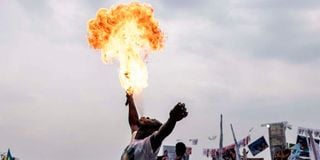Voters in DR Congo veer between despair and hope

A supporter of President of the Democratic Republic of the Congo (DRC) and leader of the Union of Democracy and Social Progress (UDPS) party, Felix Tshisekedi, and blows fire at a campaign rally at Sainte Therese in the Ndjili district of Kinshasa on December 18, 2023.
Kinshasa,
On the eve of elections in the vast and impoverished Democratic Republic of Congo, voters of all stripes voiced hopes on Tuesday that the poll would be well-organised and conducted without violence.
Forty-four million people are registered to vote in the concurrent presidential, parliamentary, provincial and municipal elections on Wednesday in the central African nation.
"Tomorrow will be calm, it's when the results come in that there could be problems," said Flory Tshimanga, a 32-year-old seller of mobile phone credits, in the capital, Kinshasa.
"I'm not saying who I'm going to vote for, because I don't want to get beaten up," he added.

A supporter of President of the Democratic Republic of the Congo (DRC) and leader of the Union of Democracy and Social Progress (UDPS) party, Felix Tshisekedi, dances at a campaign rally at Sainte Therese in the Ndjili district of Kinshasa on December 18, 2023.
After a month of rallies and tense political rhetoric, the official election campaign drew to a close on Monday night.
President Felix Tshisekedi, 60, is running for a second five-year term.
Most observers agree that he has a healthy chance of winning the first-past-the-post presidential vote, given that the opposition is divided.
Logistical problems remain a major worry ahead of the vote, with concerns that voting materials won't reach polling stations on time.
An unidentified number of voter cards are also illegible, due to poor printing, raising further questions.
We have hope
The DRC is one of the poorest nations in the world, with dire infrastructure.
Militia violence also plagues several of its eastern provinces.
But in the Kintambo district of Kinshasa, some voters were upbeat.
Eric Ikoma, a civil servant wearing a T-shirt adorned with the president's face, said: "We've been assured that the material will be in the polling stations."
Many in the area said they planned to vote for Tshisekedi.
Fare collector Gedeon Panzu, 27, said that the president had been hampered by the Covid pandemic in his first term.

Supporters of President of the Democratic Republic of the Congo Felix Tshisekedi, gather during a campaign rally at Sainte Therese in the Ndjili district of Kinshasa on December 18, 2023.
But, during a second term, "he's going to work miracles", Panzu said.
Under the watchful eye of Tshisekedi supporters, Josephine Guyguy, 59, plucked up the courage to say that she would vote for presidential candidate number 3.
She was referring to business magnate and former provincial governor Moise Katumbi, who is officially listed as candidate number 3.
Katumbi is also chairman of the country's leading football club, Tout Puissant Mazembe, and is seen as the president's most serious challenger.
"We have to choose the best, and with number 3, we have hope," Guyguy said.
God help us
In the southeastern city of Lubumbashi, Katumbi's stronghold, Mulumba Kalombo said he was also planning to vote for the veteran opposition figure.
"Felix is an ingrate," Kalombo, a 46-year-old hawker said, referring to the incumbent president.
Syrile Mulaj, a 67-year-old political scientist in the same city, declined to tell AFP her preferred candidate.
But she stressed she was planning to cast a ballot, even though she believed the results were rigged.
But others will not vote for that reason.
"It's a waste of time for me," said Melissa Feza, 53, who called the vote a "facade".
Mistrust is also rife in Goma, an eastern city almost surrounded by M23 rebels.
"God help us, so that whoever we vote for is the one who will be proclaimed," said Eric Mumbere, who is aged 27 and unemployed.

Supporters of President of the Democratic Republic of the Congo Felix Tshisekedi, gather during a campaign rally at Sainte Therese in the Ndjili district of Kinshasa on December 18, 2023.
Whitney, an informal petrol seller, agreed. "Whether we vote for him or not, he's going to win," he said, referring to Tshisekedi.
The president came to power after an election in 2018, which many observers, including the Roman Catholic Church, said he had in fact lost.
For her part, Esperance Mazika, 50, who trades in maize west of Goma, said she was unsure she would even be able to vote.
Like many others across the country, her voter card has faded.
"It's a problem," she said.
The DRC's electoral commission has repeatedly assured voters that they will be able to cast ballots on polling day, regardless of the legibility of their card.





